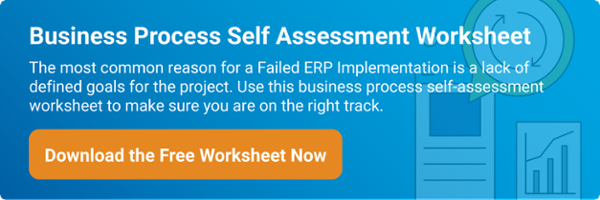
Out with the old and in with the new. SaaS solutions are not just a fad—they are resource- and money-saving systems that businesses of all sizes are jumping to implement. When businesses use disparate systems, it creates a lag in data sync and delays processes. Whether in the B2B or B2C space, cloud ERP really does help transform businesses. Here’s why.
Drive Cost Efficiencies
ERP software should have a low total cost of ownership and shouldn’t require a budget for servers and storage. Cloud technology, or SaaS, is usually pay-per-user so your business benefits from paying for only the things you need and lowering your infrastructure costs.
Think about the resources used when systems are forced to “talk to each other,” or when it’s time for an update. The cloud is an effective way to save money on IT costs, invoicing costs, maintenance costs, and more. When you purchase a cloud ERP solution, it is important to remember that you only purchase what you need based on your requirements.
Enable Mobility
Starting from the basics, cloud technology means that it can be accessed from the Internet. With today’s networking, the internet can be accessed nearly anywhere at any time. Mobility is one of the top drivers as to why businesses are using cloud ERP. Organizations use the cloud to expand geographically, open new subsidiaries, and grow internationally. Cloud technology makes it easier to enable a mobile workforce because implementation deployment is faster, usually only taking about six months.
The other factor is that a cloud-based solution is easier to scale and will align any or all locations on a single platform for simple management.
Better Data = Better Decisions
Imagine you walk into the office and have a decision to make that is detrimental to your budget. You pull reports, meet with your accounting team and CFO to get more reports and analyze them under pressure. Now imagine walking into your office, logging into the ERP system, and having a single dashboard with all the metrics you need to base your decision on. It is much easier to make good business decisions when reports are comprehensive and when they are showing the latest information.
An indicator that your Financial/ERP software lacks an effective strategy is that it has become increasingly isolated from your other systems. All platforms your company purchases should have the capability of integrating or adding on. Older platforms are localized to their own databases and networks. This means that information is not shared automatically or easily. Data silos not only affect accounting and finance, but also all other functions of the business making reporting and decision-making inaccurate.
Read More: The Risk of Fragmentation with Cloud Silos
Global Expansion
Imagine the ability to manage multiple locations from a single platform, from anywhere. That’s what cloud ERP can do. Companies have a much easier time expanding locations when they can manage financials, inventory, customers, and all other aspects of the business on a single system. Systems like NetSuite also support multi-currency and multi-language functionality to further aid business management across seas. Cloud-based ERP software takes care of the hard work so business owners can focus on innovating.
Explore New Business Models
The processes that worked for your business five years ago might not be the right fit in today’s market. Cloud technology is meant to be agile and flexible. After companies are fully transitioned to the cloud, it is much simpler to deploy new ways of streamlining processes because of the flexibility cloud systems have.
As time goes on, old ERP software gets left behind. What was once an effective system may no longer fit your business needs or have the ability to process the information you need. If your ERP system lacks specific functionality to meet your business goals, teams often default to shortcuts, workarounds, and force old software to give you the results you need.
Faster Time to Market
The go-to-market strategy for any offer is always time-bound. Having a system in place to handle a new offering is necessary and further having a system in place that enables faster time to market creates a competitive advantage. With modern cloud solutions, businesses run on a single platform. Giving employees the tools they need to communicate with other departments, organize documents and share data leads to faster time to market. It’s amazing how far ahead companies are when processes, people, and technology are aligned.
Businesses rely on cloud software and cloud ERP solutions as a catalyst for transformative initiatives such as global expansion, exploring new business models, and faster time to market. All of which will be described below.
Global Expansion: Imagine the ability to manage multiple locations from a single platform, from anywhere. That’s what Cloud ERP can do. Companies have a much easier time expanding locations when they can manage financials, inventory, customers, and all other aspects of the business on a single system. NetSuite ERP supports multi-currency functionality to further aid business management across seas. Cloud-based ERP software does the work so business owners can focus on innovating.
Explore New Business Models: The processes that worked for your business five years ago might not be the right fit in today’s market. Cloud technology is meant to be agile and flexible. Business cloud strategists like 360 Cloud Solutions help organizations realign their processes to make business more efficient and in turn, can actually transition not only your business system but your business model. After companies are fully transitioned to the cloud, it is much simpler to deploy new ways of streamlining processes because of the flexibility cloud systems have.
Faster Time to Market: The go-to-market strategy for any offer is always time-bound. Having a system in place to handle a new offering is necessary and further having a system in place that enables faster time to market creates a competitive advantage. For example, NetSuite has partnerships with various other solutions so businesses that use NetSuite for ERP can integrate other systems and gain efficiency.
With modern cloud solutions, businesses run on a single platform. Giving employees the tools they need to communicate with other departments, organize documents and share data leads to faster time to market. It’s amazing how far ahead companies are when processes, people, and technology are aligned.




